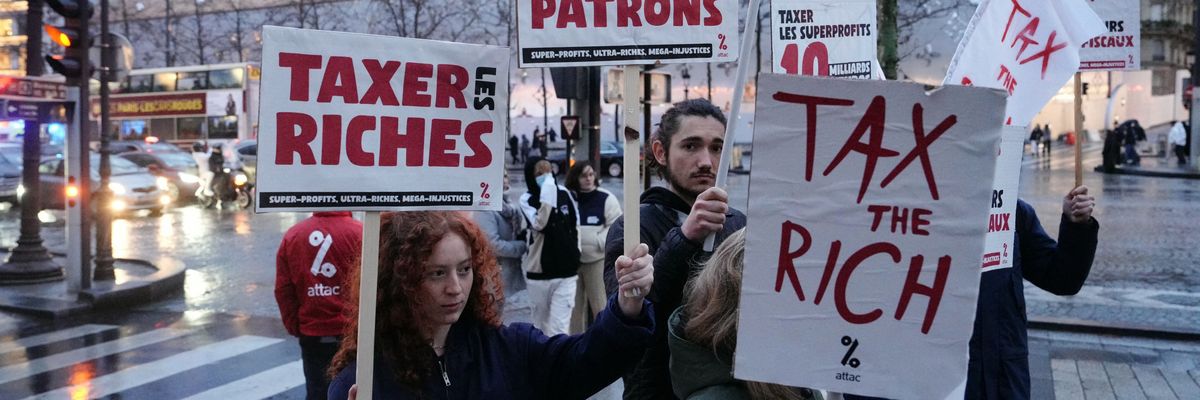Years of tax cuts and elites' "war on democracy" have fueled inequality and harmed G20 nations' ability to fund basic public services, according to a new Oxfam analysis.

Protesters hold placards reading "Tax the rich" during a protest in Paris, France on February 24, 2024.
(Photo: Dimitar Dilkoff/AFP via Getty Images)
JAKE JOHNSON
Feb 27, 2024
COMMON DREAMS
An analysis released Tuesday by Oxfam estimates that the richest 1% in G20 countries have seen their top income tax rates plummet by around a third in recent decades, a trend that the group attributed to political and economic elites' yearslong "war on fair taxation."
Oxfam's analysis was published as G20 finance ministers and central bank governors convened in São Paulo, Brazil for their first meeting of 2024.
The humanitarian and anti-poverty group noted that in Brazil, the United States, the United Kingdom, France, and Italy, the mega-rich pay a lower effective tax rate than the average worker following years of regressive cuts across the G20, which is home to most of the world's billionaires.
In 1980, Oxfam said Tuesday, the average top marginal tax rate across G20 nations was 59.5%. By 2022, the top rate had been cut to 40.4%—a 32% drop. In the U.S., tax cuts under the Bush and Trump administrations cut the top marginal rate for wealthy Americans and added roughly $10 trillion to the national debt.
The richest 1% in G20 countries collectively brought in more than $18 trillion in income in 2022.
"Countries are putting more and more money and power into the hands of a tiny, inequality-fueling elite," Katy Chakrabortty, Oxfam's head of policy and advocacy, said in a statement Tuesday. "As the finance ministers of the world's largest economies gather this week, the focus should be agreeing on policies that close the gap between the richest and the rest—that means fairer taxation and support for everyone."
Katia Maia, executive director of Oxfam Brazil, said the global "war on fair taxation has coincided with a war on democracy, putting more money and power into the hands of a tiny, inequality-fueling elite."
"As the finance ministers of the world's largest economies gather this week, this contest takes center stage: will they reclaim their democracies by taxing the super-rich?" Maia asked.
"A fair tax system can curb inequality and foster healthier, more inclusive societies."
Ahead of this week's meetings in São Paulo, Brazilian Economy Minister Fernando Haddad said he plans to present "a proposal to tax the super-rich, based on the best studies available."
"I cannot go into specifics yet," Haddad said in an interview with the Brazilian newspaper O Globo, "but I do confirm that we will continue to defend progressive taxation as a goal in the G20."
Oxfam estimated that a 5% wealth tax targeting multimillionaires and billionaires in G20 countries could raise around $1.5 trillion a year in revenue, which the group said would be "enough to end global hunger, help low- and middle-income countries adapt to climate change, and bring the world back on track to meeting the United Nations’ Sustainable Development Goals (SDG)—and still leave more than $546 billion to invest in inequality-busting public services and climate action in G20 countries."
Currently, according to Oxfam, just eight cents in every dollar in tax revenue raised in G20 nations comes from levies on wealth.
A recent survey conducted on behalf of the Patriotic Millionaires, a U.S.-based advocacy group that supports progressive taxation, found that 74% of millionaires in G20 countries approve of higher taxes on wealth. The poll also showed that 70% of respondents view extreme concentrations of wealth as harmful to democracy.
"A fair tax system can curb inequality and foster healthier, more inclusive societies," Maia said Tuesday. "Higher taxes for the super-rich means being able to invest in working families, protecting the climate, and making important public services like education and healthcare available to all. It also means being able to repair holes in social safety nets, to soften the blow of future crises."
No comments:
Post a Comment